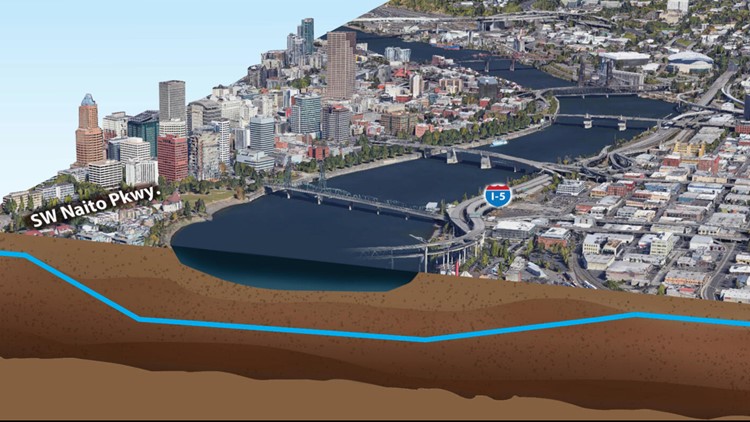PORTLAND, Ore. — The Portland Water Bureau is hitting pause on the Willamette River Crossing, a long-developing project to upgrade the transmission pipes that carry the city's water supply under the Willamette River to reach downtown.
The existing pipes are more than half a century old and are expected to fail during a major Cascadia Subduction Zone earthquake, cutting off west Portland's water supply. The plan to replace them has been in the works since 2010.
The project is in the final design stages and was on track to begin construction in earnest later this year, the bureau said, but challenges cropped up during testing last year that prompted the project teams to recommend a new alignment and tunneling method for the replacement pipes.
New inflation projections intensified the project's financial risks in the past two months, leading to the decision to pull back. In a news release, the Water Bureau blamed the delay on inflation and supply chain disruptions as well as multiple competing infrastructure projects in the same timeframe.
"The Willamette River Crossing is a critical project necessary for providing water to the west side of the Willamette River following a Cascadia Subduction Zone earthquake. We know we have the right technology and the right approach to build this critical crossing, but this is not the right moment," Water Bureau Chief Engineer Jodie Inman said in a statement.
The bureau said it intends to shut down the project's worksites and close its construction contracts, hitting pause for about a year before resuming work on an updated design and putting it out for bids with an eye toward starting construction in the 2027-28 fiscal year.
"Willamette River Crossing remains a priority project for me and the Portland Water Bureau, but we face serious competition for construction resources. A delay in construction will allow us to adapt while responding to community concerns about development in the RiverPlace neighborhood," said Commissioner Mingus Mapps, who oversees the bureau.
Geotechnical experts did a small-scale "pilot bore" in August 2020 to look for obstacles in the path of the new pipe, but the test revealed problems with the project plan, the bureau said.
The original plan called for the use of "Horizontal Directional Drilling" to drill a hole that would stay open until the pipe was threaded through later, but the test hole collapsed and filled in with gravelly soil, indicating that the HDD method wouldn't work.
The bureau has spend $38 million on the project over the past 10 years. The Tuesday news release did not say how much it is expected to cost if completed on the new schedule.



